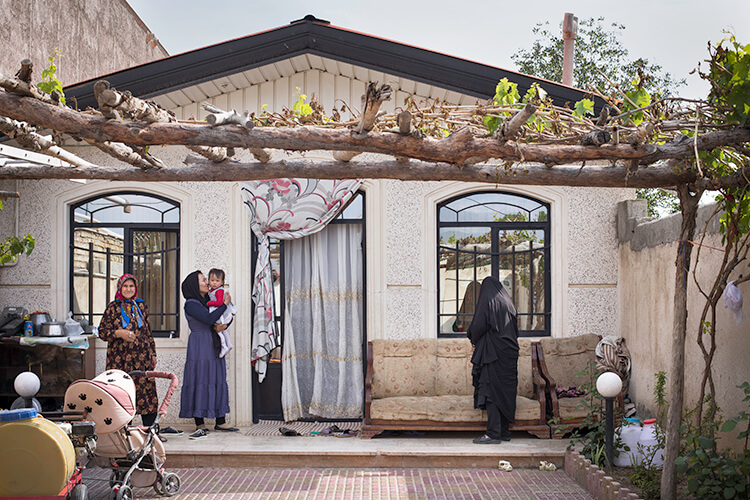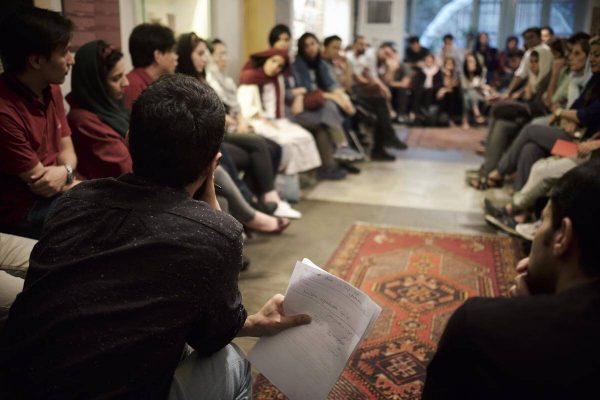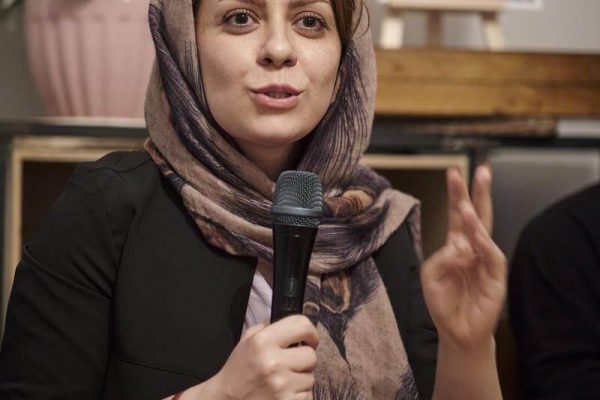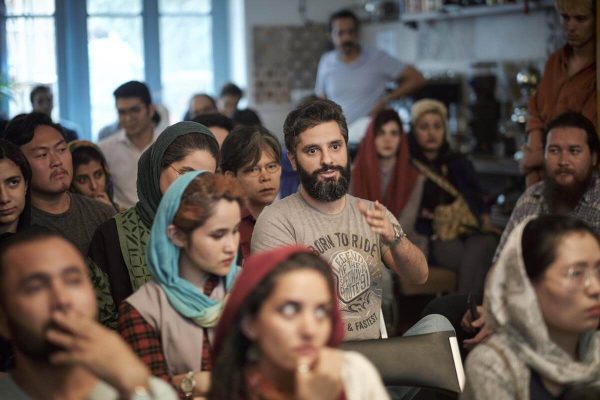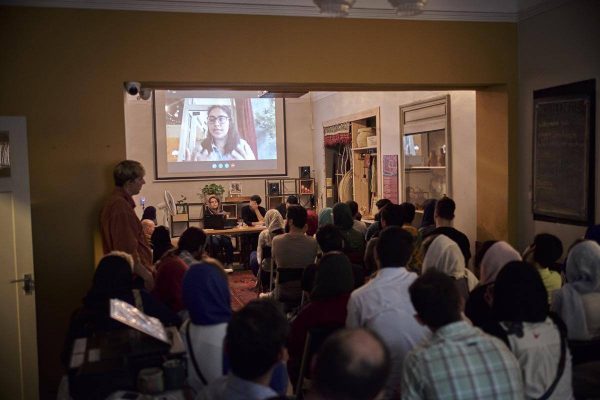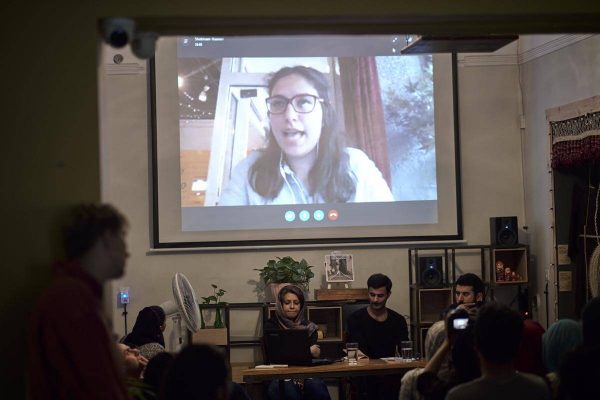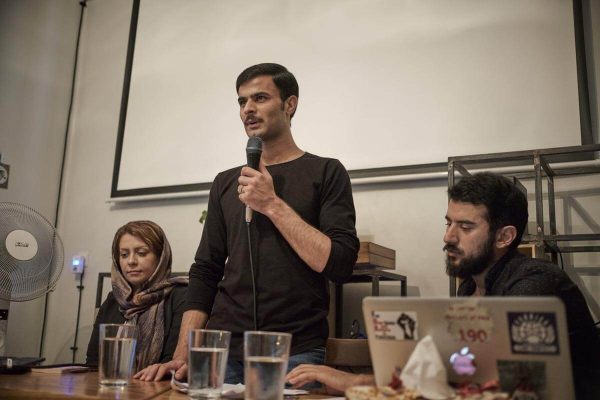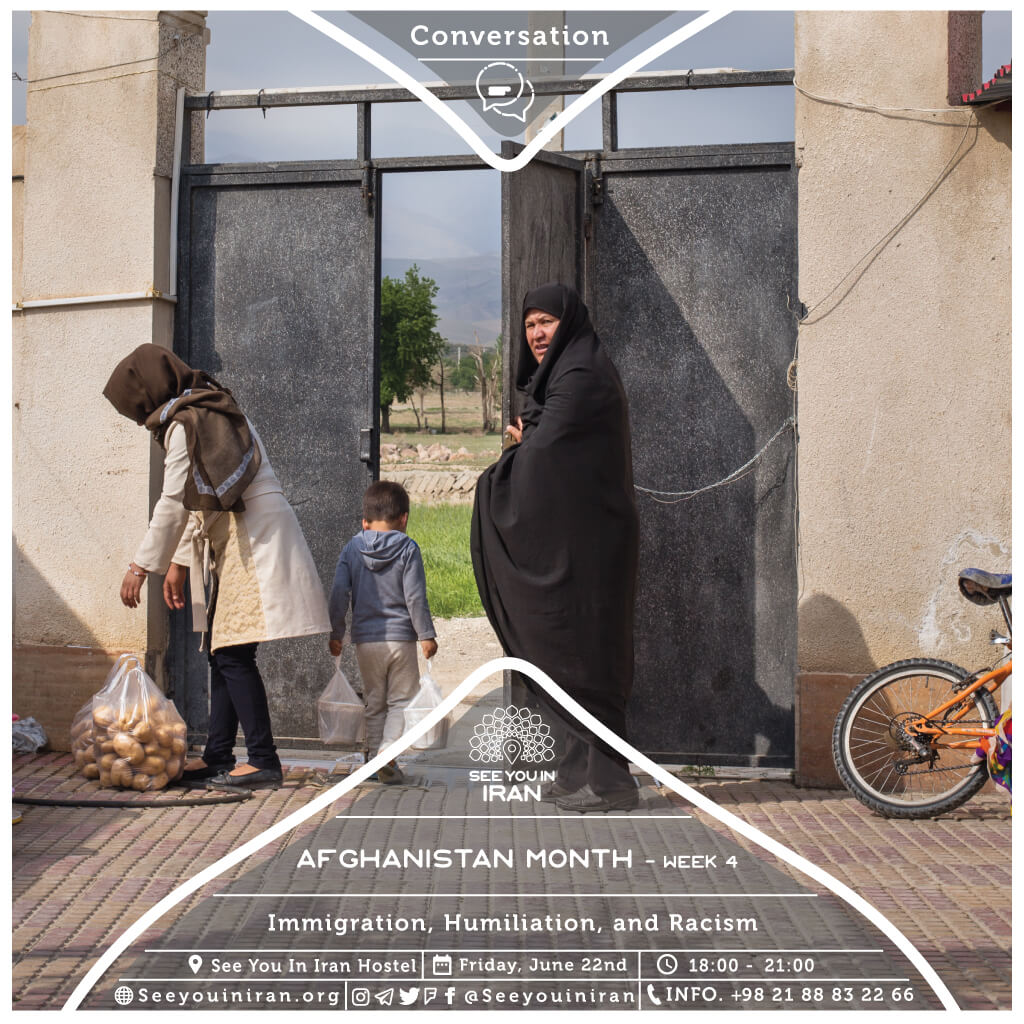Part 1: An overview of the last night of Afghanistan
The fourth and final night of Afghanistan month comprised of three different sections. First Feiz Ahmad talked about his personal experiences on the path of immigration. He shared his memories from when he lived in Harat and how the general status of living was over there. Then he carried on to explain what kind of horrid incidents he has witnessed throughout past few years to get where he is at this point of time. After Feiz Ahmad, Shabnam Nasimi, who currently is a master student, talked about Afghanistan and Central Asian Association activities that are focused on liberating refugees from the sense of isolation that’s intertwined with immigration, in England. Narmin Nikdel as the last speaker talked mainly about humiliation from psychological stand point and integration of different generations of Afghan refugees with local population. After the organizers finished presenting their point of view on the matters, participants, who ranged from Afghan diaspora and expatriates, sociologists, Iranians who are concerned about the mentioned topics and so forth, started proposing questions and solutions regarding the issue. The vibrant discussion took around two hours. Our guests dined at See You in Iran café when the event was finished and were treated to an Afghan delicacy while still discussing and sharing propounded ideas throughout the evening.
Part 2: The Path from Harat to Tehran
First Feiz Ahmad genuinely shared the journey he has been through to get to where he is at this point. He is now one of the members of the See You in Iran team though he has stumbled upon numerous traumatizing circumstances throughout his life. He talked about how he felt unfettered in Harat, his birth place, even with constant presence of terror that has been influential in his life as he explained thoroughly later on. Feiz ahmad is from Pashtun background which, in his words, is the dominant ethnicity in Afghanistan and biased towards other cultural backgrounds. Most memorable moments of his young age was created by being in the company of his family and village members where they’d go to picnics and he and his mates would saunter of to the hillsides. Feizi, short for feiz ahmad, struggled with Afghanistan’s education system to an extent but became interested after a while. He immigrated to Iran in hope of finding better job opportunities a little over two years ago. After bouncing from one job to another he decided to go back to Afghanistan but realized the situation in his home country has worsened. Feiz ahmad came back to Iran again where he found his current work place and decided to extend his visa but was harshly mistreated at the Immigration police. He got his passport thrown at him and was told that he will be confronted with the officials if he tries to overstay in the country. That was the turning point that he decided to illegally remain in Iran. He has been confronted with social humiliation in a few occasions. He complains about how people change their attitudes towards him as soon as they realize he is an Afghan immigrant. In one occasion at an institute where he studies English as an extra curriculum activity, his classmates stopped socializing with him and started to ignore his presence altogether just because they found out where he was from. Feizi doesn’t feel as comfortable as he did in Afghanistan and although he encounters racism from time to time he feels safe staying in Tehran. He is anxious when faced with law enforcement and afraid that he can be unjustifiably interrogated on the spot and be accused of crimes he hasn’t committed. In one occasion he was questioned and searched by the police where the officer asked to get access to his phone’s contents which is not a common occurrence for local citizens. When nothing was found he was let go. He was questioned and accused of substance use in another occasion and after being asked some questions he was let go few minutes later. His friends were threatened of getting deported after getting detained by the immigration police. When asked how you think Iranians perceive living in Afghanistan Feiz ahmad replied: Iranians feel uneasy about travelling to Afghanistan because they have misconceptions about how to manage while over there; however, he points out that there are safe regions for travelling and it is straight forward to sort things out whilst over there.
Part 3: Nasimi family, Afghanistan and Central Asian Association
Shabnam Nasimi is a Masters student at Birkbeck University, London. She graduated from the Open University in 2016 with a BA Hons in Law. Whilst studying she has been extensively involved in running the ACAA (Afghanistan and Central Asian Association), a charity that was founded by her father Dr. Nooralhaq Nasimi in 2001 to support refugee integration in the UK. As part of her work at the ACAA she has worked on a diaspora-led development program in Afghanistan as well as supporting women and families who are refugees and asylum seekers in the UK. Shabnam’s speech was mainly focused on ACAA and their endeavors.
Part 4: Psychology of Humiliating Interactions Amongst Refugees and Locals
Narmin Nikdel who is a PhD student of sociology at Tabriz University, Lecturer at the Payame Nour University (Tehran west branch) talked about “Emigration and Social Humiliation”. She initially attempted to answer a few fundamental questions. Questions that need to be answered if the situation is to improve. How immigrants face humiliation? How different forms of humiliation can be distinguished? What are their strategies to confront degradation? What are the features of a dominant humiliating culture and how this culture is speeded amongst groups that encompass this culture? How do these groups perceive humiliating the immigrants in their own country and lastly what are the facilitating mechanisms for socially humiliating the immigrants?
Revolving social humiliation, she mainly focused on the principle of social psychology that is defined in interactions. When an interaction occurs, what gets socially constructed between a refugee and a citizen and what are the characteristics of humiliator? From a refugee perspective, distance from Watan (homeland) and everything they are familiar with, humiliation is conceivable and it can be gauged depending on history or background. From a citizen point of view, when the borders are defined, the concept of “alien” is constructed that naturally rises questions such as how to interact with them? How will they profit from my country’s resources and so on. Consequently, discourses such as “Myself-Another” which contradicts “Citizen-Subject”, emerge and in return they contribute to different forms of humiliation, isolation and seclusion.
Talking specifically about Afghan refugees in Iran, during the early years of revolution a vast number of refugees started entering Iran and they were extremely welcomed. Welfare, education and health supplies were provided for them. It is worth to mention 2000 Afghans were killed in Iran-Iraq war. So, the difference between immigrants and citizens was minimum. For three decades, with minor fluctuations, everything remained the same. It was at the beginning of the 1390’s that another way of perception (top-down) transpired within the society with regards to Afghan immigrants. The general mentality towards Afghans was altered and also there was an increase in the flow of Afghan immigrants to Iran. This process is what distinguishes the three generations of Afghan immigrants from each other. First is those young or middle-age Afghans who entered Iran in the years after the revolution. Second and third are those who were either born in Iran or entered when they were young. There’s a difference between the impressions of humiliation among the last two groups. The second and third were born here so they perceive Iran as their homeland and they won’t face humiliation before they integrate in the society where they get labelled as “alien”. They start interpreting a wide range of experiences as social humiliation. The simplest one is when they are called or call one another, “Afghani” as an insult. They become discredited and stigmatized by such label which results in a duality of social behavior standards. So, they start using clothing, accent, and their social network to destroy whatever that signifies their Afghan origin. On the other hand, their family and friends want them to keep their identity. Another means of humiliation is through education where due to lack of infrastructure the promise of free education for every ethnic group didn’t pan out and ended up dispersing the population socioeconomically. A paradox of the law. So, for the second and third generation Iran is not a homeland but spatial transition phase. Needless to say that since Afghan men are more victimized through humiliation, they practice and reproduce that sense in family over women.
Part 5: Refugees and Their Struggles, Widening the Perspectives
There took place a lively discussion afterwards about the issue of refugee humiliation to a broad extent.
A participant who runs one of the NGOs that work closely with children that are prone to social and mental harm due to child labor and women who are susceptible to the same damages, proposed that creating campaigns and making demands on a social scale can be used to improve how the mentioned target group cope. Social humiliation is not restricted to any social level and even in marginalized areas Iranians don’t take advantage of the services these NGOs offer because the assumption is, these organizations are filled with asylum seekers so they tend to distant themselves from refugees. Another participant who teaches English during her spare time shared an opinion that belongs to a masters of psychology student of hers. After one of the horrendous suicide bombings in Kabul when she showed her sympathy, he said and she quoted “don’t worry all that much about them, all and all genetics is important”.
Of course, there are organizations that support refugees and put the effort as much as possible but considering the bigger picture, have they taken refuge in our country because of its perks or has it been a matter of life and death? And how has it turned out form them? While a great percentage of them deem prosperity as having a motorcycle or opening up a bank account, how can we hide behind numbers and statistics to show that we are one of the most welcoming countries for refugees?
The lack of regulations concerning refugees in Iran was brought up and how in Iran these laws aren’t in support of afghan refugees to an extent that the refugees unconsciously deprive themselves from anything they might be righteous to.
The issue became more evident when someone quoted a memory in which two Iranians had gotten into a fight on a street and an afghan person tried to break it up. When police intervened, they arrested the afghan person instead of the two Iranians responsible. No matter how much he insisted that he’s innocent, police went back to the scene to talk to witnesses and only then they were convinced. Amin said one of his afghan friends who lives in Australia at the moment was abused and humiliated by his employer. He was supported by the law to sue his employer and was compensated for the mishap. The employer was urged to officially apologies to him later on.
The fact that refugees in many countries struggle to various degrees is indisputable. Mona, an English teacher who taught in Italy, talked about her experience as an Iranian abroad. Another teacher from Germany alongside Mina started working at the same time in a primary school. When the principle introduced mina to her students as the new teacher from Iran, everyone kept staring at her with angst and apprehension. She mentioned, just because of the different cultural background she had to work twice as much as the other teacher even though she was more experienced. Another participant said he’s been living a life of an immigrant for 17 years and wherever he’s been to, there has always been a bias towards immigrants and it’s not constraint to geopolitical borders or which country you go to, as soon as you become an immigrant you just have to await the adversities.
In terms of fundamental research work Majid, a sociologist, stated that if these researches won’t turn to activism to promote reforms regarding these matters, not only they haven’t served their purpose but they might even perpetuate the cycle of social humiliation and racism.
All things considered the issue of refugees and social humiliation remains an issue that requires consideration all around the world. During the Afghanistan month the See You in Iran team tended to cover as much of these issues as possible while remaining mindful of the fact that issues as such, takes much more effort to get even slightly improved. Hoping that these gatherings, as abstract as they are given the circumstances, could be a starting point for even the smallest reforms.
قسمت نخست: کلیتی از شب آخر ماه افغانستان
چهارمین و آخرین شب ماه افغانستان متمرکز بر سه سرفصل مهاجرت، تحقیر اجتماعی و نژاد پرستی برگزار شد. در طول این سه بخش فیضاحمد در مورد تجربیات شخصی خود در مسیر مهاجرت صحبت کرد. از نوجوانی خود گفت و اتفاقات هولناکی که از نزدیک شاهد آنها بوده است. ازاجبار برای مهاجرت، چگونگی شاغل شدنش و در پی آن بهبود شرایط زندگی خود و همچنین رفتارهایی که در این روند با آنها روبرو شده است تعریف کرد. در بخش دوم،شبنم نسیمی راجع به اهداف انجمن افغانستان و آسیای مرکزی و فعالیتهای خود در این انجمن سخن گفت. این انجمن در زمینۀ بهبود شرایط زندگی مهاجران و یاد دادن مهارتهای لازم برای دستیابی به این مهم به آنها فعالیت میکند. نرمین نیکدل، دانشجوی دکترای جامعهشناسی در دانشگاه تبریز، به بررسی مسئلۀ تحقیر مهاجران و واکاوی آن از دیدگاه روانشناختی در بخش سوم پرداخت. تفاوتهای بوجود آمده در سه نسل از مهاجران و نحوۀ روبرو شدن آنها با تحقیر اجتماعی و نژادپرستی از موارد بررسی شده در صحبتهای نرمین میباشند.در آخر حاضرین به اظهار نظر و عقیده در مورد موضوعات مطرح شده پرداختند.بحث و گفتوگو در این ارتباط حدود دو ساعت به طول انجامید. بعد از به اتمام رسیدن این رخداد از مهمانان با غذای محلی افغانستانی پذیرایی شد.
قسمت دوم: فیض احمد و مهاجرت از هرات
در ابتدا فیض احمد تجربیات چند سال اخیر زندگیش را با شرکتکنندگان به اشتراک گذاشت، اتفاقاتی که در مواردی تکان دهنده بودند. فیض احمد از تبار پشتون، قومیت غالب و حاکم برافغانستان است. او زندگی در هرات را علی رغم تمام سختیها و ناامنی ها خوشایند می داند. خاطرات شیرینی از دوران کودکی برایش بجا مانده و روزهایی که با خانواده و هم روستاییها دستهجمعی به گشت و گذار در طبیعت می گذراندند را از محبوبترین آنها می داند. با کلاس درس در ابتدا رابطه خوبی نداشت اما پس از مدتی به درس خواندن علاقهمند شد و با اشتیاق در مدرسه حاضر میشد.نزدیک به دو سال پیش بود که برای پیدا کردن شغلی مناسب به ایران مهاجرت کرد. چند شغل از طرف اقوامش در ایران به او پیشنهاد شد که به دلایل مختلف در هیچکدام دوام نیاورد. تصمیم گرفت به افغانستان برگردد. هنگام بازگشت اما متوجه شد وضع معیشت در افغانستان دشوارتر از قبل شده و مجددا به ایران مهاجرت کند.بعد از بازگشت به ایران و پیدا کردن شغل فعلیش در See You in Iran، به منظور تمدید ویزا به پلیس مهاجرت مراجعه کرد. در آنجا نه تنها جواب رد شنید و پاسپورتش به طرفش پرتاب شد، بلکه با تهدید بازداشت در صورت ادامه اقامتش به صورت غیر قانونی روبرو شد. بعد از این اتفاق تصمیم گرفت به هر طریق ممکن در ایران بماند. فیض احمد با مسالۀ تحقیر در چند مورد تا به حال روبرو شده است که بارزترین آن تغییر رفتار اطرافیان بعد از پیبردن به ملیت و مهاجر بودنش است. به طور مثال در کلاس زبان انگلیسی، این تغییر رفتار بلافاصله بعد از معرفی خودش به عنوان یک مهاجر افغان اتفاق افتاد در صورتی که قبل از آن رفتار همکلاسیهایش با او بسیار دوستانه و به دور از هرگونه تبعیضی بود. بعد از آن همکلاسیهایش دیگر علاقهای به همصحبت شدن با او از خود نشان ندادند. فیض احمد در تهران احساس امنیت میکند اما نگران مواجهه با پلیس نیز هست. در یک مورد هنگام برگشت از خانۀ خواهرش پلیس جلویش را میگیرد و بازرسی بدنیش می کند. از او میخواهند که قفل گوشیش را باز کند تا بتوانند محتویاتش را بررسی کنند. بعد از آن که چیزی پیدا نشد به او گفته میشود که محل را ترک کند و به راهش ادامه دهد. در موردی دیگر او و دوستانش مورد مواخذه بیدلیل پلیس به اتهام مصرف مواد مخدر قرار میگیرند. همچنین چند تن از دوستانش هنگام کار در یک کارگاه ساختمانی دستگیر و تهدید به اخراج از کشور میشوند هر چند مهاجران قانونی به حساب میآمدند و مدارکشان در آن زمان بینقص بود. فیض احمد معتقد است اگر مردم خودشان را به جای او بگذارند و شرایطش را درک کنند رفتار بهتر و به دور از تحقیری با اوخواهند داشت. توصیه او به ایرانیان در مورد سفر به افغانستان این است که به مناطق امن سفر کنند و باور دارد برداشت اکثریت مبنی بر ناامنی در افغانستان با واقعیت فاصلۀ قابل توجهی دارد.
قسمت سوم: شبنم نسیمی و انجمن افغانستان و آسیای مرکزی
در قسمت دوم، شبنم نسیمی، دانشجوی مقطع فوق لیسانس حقوق در دانشگاه بربک (Birbrck) لندن در مورد تطبیق زندگی مهاجران و پناهجویان با تمرکز بر مهارتها و دانش ضروری برای ایجاد زندگی موفقیت آمیز در کشور انگلستان نکاتی را برشمرد. صحبتهای شبنم بیشتر حول محور فعالیتهایش در انجمن افغانستان و آسیای مرکزی (Afganistan and central Asian association) متمرکز بود.این انجمن از طرف پدر شبنم، دکتر نسیمی پایهگذاری شده که خود در سال 1999 به انگلستان مهاجرت کرده است. برای آشنایی بیشتر با فعالیتهای این انجمن به وبسایت acaa.org.uk مراجعه کنید.
قسمت چهارم: نرمین نیکدل و مسأله تحقیرمهاجران از منظر روانشناختی
نرمین نیکدل، دانشجوی مقطع دکترای جامعه شناسی دانشگاه تبریز سخنران بخش سوم آخرین شب ماه افغانستان بود.نرمین که در حال حاضر مدرس دانشگاه پیام نور در تهران است میگوید: عموماٌ مهاجرت فرزند نامالیمات و فقدان بسترهای رشد و دستیابی به امیال و آرزوهای انسانی در وطن است و در ذات خود با نوعی واپس زدگی همراه است که تجربه آن در مقصد و در هیبت تحقیر اجتماعی ادامه مییابد. نرمین در پی پاسخ داد به سوالاتی است که بهتر شدن شرایط مهاجرت مشروط به پیدا کردن جوابی قابل قبول برای آنهاست.سوالاتی از قبیل: مواجهه و درک مهاجران با تحقیر اجتماعی چگونه است؟ چه تفاوتی میان انواع مصادیق تحقیرِمهاجران وجود دارد؟ استراتژیهای آنان در دفع تحقیر چیست؟ ویژگی های فرهنگ مسلط تحقیرکننده چیست و چگونه این فرهنگ در میان برخی گروههای مهمِ تحقیرکننده رواج یافته؟ این گروهها چه درک وتصوری از تحقیر مهاجران در کشور خود دارند؟ و در نهایت مکانیسم های تسهیل کننده فرایند تحقیر اجتماعی مهاجران چگونه عمل می کند؟
از دیدگاه یک مهاجر دوری از “وطن” و محیط آشنا او را نسبت به امر تحقیر آسیبپذیر میکند. میزان این آسیب با توجه به پیشینۀ تاریخی متغیر است. از دیدگاه میزبان، با شکلگیری مرزها مفهوم “بیگانه” تولید میشود که این امر باعث بوجود آمدن سوالاتی از قبیل: برخورد با یک بیگانه چطور میسر است؟ چگونه آنها از منابع کشور من منتفع خواهند شد و سوءاستفاده خواهند کرد؟ و… این نوع نگرش باعث ایجاد و گسترش گفتمانهایِ غلظت یافتهای همچون گفتمان من-دیگری که بیش از همه در تقابل شهروند-تبعه است، می شود که جهان بینی خاصی را فرامی خواند و اشکال متفاوتی از تحقیر، طرد و انزوا را بوجود می آورد.
مهاجران افغان در سالهای اولیه انقلاب از شرایط خوبی در زمینههای تحصیل، درمان و معیشت برخوردار و این شرایط با تغییرات اندک تا سه دهه به همین منوال پایدار بودند. با شروع دهۀ نود و با تغییر تفکر جامعه نسبت به امر مهاجرت اما این شرایط رو به تغییر گذاشتند. این فرایند باعث ایجاد فاصله بین سه نسل از مهاجران افغان گردید. گروه اول مهاجران اوایل انقلاب، گروه دوم متولدین ایران در خانوادههای مهاجر و گروه سوم جوانان مهاجر. گروه دوم و سوم به علت متولد شدن در داخل ایران یا سابقۀ شهروندی طولانی در کشور خود را ایرانی در نظر میگیرند و این امر باعث میشود تا قبل از وارد شدن به اجتماع به عنوان افراد بالغ با امر تحقیر روبرو نشوند. بعد از مواجه با این امر که باعث بوجود آمدن دوگانگی در رفتار اجتماعی میشود آنها شروع به راندن هرآنجه نشانی از فرهنگ افغان دارد، میکنند.در طرف مقابل خانواده مصر است که این ارزشها را حفظ کند. تحصیل نیز با وجود وعدۀ دولتمردان به دلیل نبود زیرساختهای مناسب از دسترس عموم خارج است و استطاعت مالی تعیین کنندهترین عامل در برخورداری از تحصیل میباشد. همین امر باعث گسست اجتماعی-اقتصادی مهاجران شده و این جامعه را بیش از پیش از یکدیگر میراند. خشونتهای خانگی نیز به علت مواجه با امر تحقیر در جمعیت مهاجرین رو به افزایش است.دلیل این امر اختلاط مردان افغان یا به اصطلاح نانآوران خانه با طبقۀ کم درآمد ایرانی به واسطۀ نوع اشتغال این هر دو گروه میباشد. مرد افغان که از طرف طبقۀ محروم و غتلباَ بیسواد تحقیر شده، خشم خود را بر سر خانواده و پس از اتمام کار و بازگشت به سکونتگاه خود خالی میکند.
قسمت پنجم: بحث و گفتگو در مورد معضلات و مشکلات مهاجرین در ایران
یکی از شرکتکنندگان که مدیریت سازمانی مردم نهاد را به عهده دارد این نکته را گوشزد کرد که تبعیض در بین طبقات مختلف جامعه نهادینه شده است. این سازمان که حمایت از کودکان کار و زنان در معرض آسیبهای اجتماعی و روانی را در دستور کار دارد، در مناطق حاشیهنشین خدماتی را ارائه میدهد که ایرانیان ساکن در آن مناطق حاضر به استفاده از این خدمات نیستند.علت این بیمیلی تمایل به دوری از مراکزیست که عمدتاَ مهاجران افغان از خدمات آنها استفاده میکنند. یکی دیگراز شرکتکنندگان که مدرس زبان انگلیسی بود نقل قولی را از یک زبان آموز تحصیل کرده (فوق لیسانس روانشناسی) بیان کرد. این زبان آموز که پس از یک بمبگذاری انتحاری در کابل که منجر به کشته شدن تعداد زیادی شهروند افغان شد، با مشاهده تأثر معلم خود گفت: “خودت را ناراحت نکن.ژنتیک در زندگی انسان نقش بسیاری دارد.”
اینگونه اظهارنظرها مبیّن نهادینه شدن نژادپرستی و ریشه دواندن حس تبعیض بین تمام اقشار جامعه است و تحصیلات و مرتبۀ اجتماعی در این میان تأثیر کمی دارند. یکی از راهحلهای مطرح شده برای بهبود وضعیت مهاجران از طرق مدنی، ایجاد کمپینهای اجتماعی و مطالبهگری در زمینههای مختلف است. در ادامه مجید به عنوان یک جامعه شناس مضرات کار صرفاَ تحقیقاتی را متذکر شد. به عقیدۀ او به علت فقدان ساختارهای مناسب کارهای تحقیقاتی ثمرۀ عملی در ایران ندارند و وارد حوضۀ کنشگری نمیشوند.این موضوع باعث میشود که این تحقیقات نه تنها به بهبود وضعیت مهاجران کمکی نکرده که به بازتولید تحقیر و نژاد پرستی نیز منجر می شوند.
هرچند نهادهای فعال در زمینۀ حمایت از مهاجرین کم نیستند اما این نکته را نیز باید در نظر گرفت که آیا این مهاجرین به علت سهل بودن فرایند مهاجرت و زندگی به ایران نقل مکان میکنند یا پای مرگ و زندگی و نداشتن اتخابی بهتر مطرح است؟
فقدان قوانین حمایتی یکی دیگر از چالشهایی است که مهاجران با آن مواجهاند.این معضل آثار بسیار مخربی بر زندگی روزمره مهاجران میگذارد. حتی در مواقعی که فرد مهاجر در مقابل یک شهروند محق است پیگیر احقاق حقوق خود نمیشود. یکی از مهمانان خاطرهای نقل میکند که در آن یک فرد افغان مانع درگیری خیابانی دو فرد ایرانی میشود اما وقتی پلیس به محل وقوع درگیری میرسد فرد افغان را بدون در نظر گرفتن اظهارات او مبنی بر بیگناهی بازداشت میکند. امین یکی دیگر از مهمانان در این زمینه اشاره می کند که وقتی یکی از دوستانش در استرالیا مورد بیاحترامی و تحقیرکارفرمایش قرار میگیرد، تحت حمایت قانون از او شکایت میکند. کارفرما نه تنها مجبور به پرداخت جریمه شد بلکه از کارمند خود نیز عذرخواهی کرد.
در اینکه مهاجرت و برخورد با مهاجرین به دلیل وجود دولت-ملتها، در تمام کشورها با نقصانهایی مواجه است شکی نیست. اما درجه تحقیر و نوع آن در کشورهای مختلف متفاوت است. مونا، یکی از شرکتکنندگان که برای تدریس زبان به دبستانی در ایتالیا رفته بود با نگاه شکاک و وحشتزده دانشآموزانش مواجه میشود. علت این برخورد صرفاَ معرفی مونا به عنوان یک ایرانی بوده است. معلمی دیگر، فاقد تجربه تدریس، همزمان با مونا شروع به کار میکند اما چون طبعۀ کشور آلمان بود از حقوق و مزایای بیشتری برخوردار میشود. حمید یکی دیگر از مهمانان که بیش از 17 سال را به عنوان مهاجر در خارج از ایران زندگی کرده است، یادآور میشود که برخورد با مهاجران در هیچ کشوری رضایت بخش نیست و مواجه با تبعیض در درجات مختلف به هرصورت یکی از تبعات مهاجرت میباشد.
در مجموع موضوع مهاجرت علاوه بر تحقیق در حوضۀهای بنیادین، محتاج به عملگرایی و کنشگری در جهت حل مشکلات روزمرۀ مهاجران است. تلاش مجموعۀ See You in Iran در ماه افغانستان فراهم کردن بستری مناسب برای بررسی مشکلات مهاجرین افغان بوده است. هرچند رفع این مشکلات نیاز به کنشی جمعی و در سطوح مختلف اجتماع دارد امیدواریم برگذاری رویدادهایی از این قبیل قدمی کوچک در جهت بهبود شرایط مهاجرین باشد.
What to Expect
Since the first days of the See You in Iran project, the interplay between hospitality and racism among Iranians toward non-Iranians has been one of the most controversial discussion topics. In honor of World Refugee Day, and as the next session of Afghanistan Month event series, we focus on different perspectives and narratives of Afghan diaspora, refugees, asylum seekers, and immigrants through their lived experiences of xenophobia, racism, humiliation, and exclusion, in the context of the incentives for emigration such as lack of resources and opportunities in their home country. In addition, our media wall is dedicated to showcase Sofia Brandes’ photo essay about an Afghan refugee family based in Karaj, Iran.
Talks Itinerary:
– “Living in Tehran as an Afghan Refugee” | Feiz Ahmad Valizadeh (See You in Iran Employee)
– “Challenges, Obstacles, and Achievements of Afghan Refugees in the UK” | Shabnam Nasimi (Master’s Student at Birkbeck University and a Member of Afghanistan and Central Asia Association in London)
– “Emigration and Social Humiliation” | Narmin Nikdel (PhD Student in Sociology at Tabriz University)
Moderator: Navid Yousefian (PhD Candidate in Political Science at UCSB)
Join us: +98 21 8883 2266
reserve@seeyouiniran.org
telegram.me/syi_reservation
Check other events here: Cultural House
Responsibilities placed on Afghanistan’s youth
“In the face of the increasing violence, a lack of unemployment, reduced international aid, and a Government stretched beyond its means, the responsibilities placed on Afghanistan’s youth are only going to get bigger and bigger.
The unfortunate truth is that many Afghan children lack both working parents and ‘compassionate guardians’, and are resigned to a life on the streets. While there is an urgent need to address these challenges, we remember the young Afghans who have made helping their families their main purpose in life.” – Rahila Muhibi, Medium

